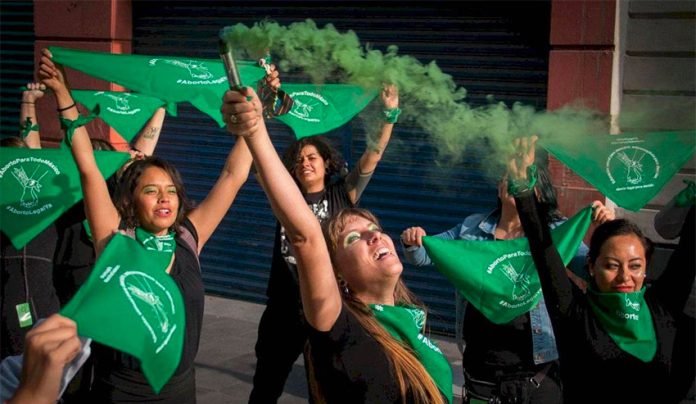President López Obrador has once again proposed holding a citizens’ consultation to decide whether abortion should be legalized in Mexico, stating that “the democratic method” is the best way to resolve controversial issues.
Speaking after Argentina’s Senate legalized elective abortion on the penultimate day of 2020, López Obrador said the people, not the government or the Catholic Church, must decide whether women should have the right to terminate a pregnancy.
“In very controversial issues, the best thing … is to consult citizens, nothing should be imposed,” the president said while declining to take a position himself.
“Everything should be in accordance with the majority decision of the people, in this case women. Let them decide freely, … the best method to resolve discrepancies [and] differences is the democratic method, that’s what I’ve always maintained,” he said.
The government must obey the people and not impose anything, López Obrador added.
“I don’t believe it’s advisable to take a decision from above, even when there is legal and legitimate representation, as the legislative [power] is. I believe that in these cases, the best thing is the application of participatory democracy. Power structures shouldn’t intervene. … [Abortion] shouldn’t be a matter of government or the [three] powers or churches but rather a matter for women.”
One of the president’s favorite catch phrases is “with the people everything, without the people nothing” and indeed he has already held public consultations to determine the fate of a range of infrastructure projects. They include the former government’s Mexico City airport, a private brewery project in Mexicali and his administration’s Maya Train railroad.
A referendum on abortion, which López Obrador has proposed previously, would be the government’s first public consultation on a social issue.
Abortion is currently legal in just two of Mexico’s 32 federal entities, Mexico City and Oaxaca, where women can legally terminate a pregnancy in the first 12 weeks. Some other states allow abortion in cases of rape or to protect the life of the mother.
López Obrador’s proposal to put nationwide legalization to a vote triggered criticism from some opposition party lawmakers who charged that human rights mustn’t be subjected to consultation.
“The Mexican state is obliged to guarantee what is established in article 1 of the constitution, … regarding human rights. The first person to respect them must be the head of the federal executive,” said Verónica Juárez Piña, leader of the Democratic Revolution Party in the lower house of Congress.
She described López Obrador’s proposal to hold a consultation on abortion as authoritarian, sexist and a backward step, asserting that the government should follow the recommendations of the Supreme Court, which ruled in 2008 that Mexico City’s decision to decriminalize abortion in the first 12 weeks of pregnancy was constitutional.
Martha Tagle, a deputy with the Citizens Movement party, said on Twitter:
“1. Rights aren’t put to consultation, the state guarantees them. 2. It’s up to the legislative power to decriminalize and legalize [abortion.] 3. It’s about recognizing women’s right to decide about their bodies.”
In another tweet, Tagle said: “If López Obrador says that ‘the people’ decide, he must recognize every woman’s right to decide if she continues or not with a pregnancy [and] to decide [what’s right] for her body. That’s why abortion must be decriminalized.”
There was optimism among pro-choice activists that the Supreme Court would deliver a ruling last July that would pave the way for the decriminalization of abortion across Mexico. But four of five judges of the court’s first bench voted against upholding an injunction granted in Veracruz that ordered the state Congress to remove articles from the criminal code that stipulate that abortion in the first 12 weeks of pregnancy is illegal.
If the Supreme Court had upheld the injunction, the decision would have set a precedent that could have led to further court orders instructing state legislatures to legalize first-trimester abortion.
Source: El Universal (sp)
